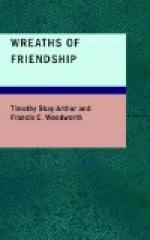“No, he managed to get out of the water; but he had a hard time of it, though. He could not swim very well, at the best; and with all his clothes on, it was as much as he could do to swim at all. If the river had been a little wider, he never could have got out alone. As it was, however, by the help of some rocks there were in the brook, he reached the shore, pretty thoroughly exhausted, and not a little frightened. His zeal for trout-fishing was by this time a good deal cooled off, as you may suppose. The nearest he came to catching any of those cunning little fellows that day, was when he tumbled into the brook; and then he had something else to think of.
“There he was, alone, wet as a drowned rat, and shivering, partly from cold and partly from fright, as if he had the ague. Poor fellow! His conscience began to be heard again, now he had time to think. He hardly knew what to do; he was ashamed to go home to his mother; and there he stood, for a good while, leaning his head on the fence near the water, the tears all the time chasing each other down his cheeks.”
“I don’t wonder he cried,” said Robert; “but I can’t help laughing to think what a sorry figure he must have made there, on the bank! And he was going to bring home such a nice string of fish, too! I wonder if his mother did not laugh when she saw him coming. Did he stay there, father, shivering and crying, till some body came after him?”
[Illustration: CHARLES, AFTER THE DUCKING.]
“No, he started for home before any of the neighbors reached the spot where he fell into the river; and, as they missed him on the way, they supposed he was drowned, and searched for his body half an hour or more, till they learned he was safe at home.”
“Well, what did his mother say to him, father?”
“She did not say much, poor woman. She was not well, as I said before, when Charles left her; and as her servant had gone away for a week, and she had no one but him to assist her in her work, she became very much fatigued; and when she heard that Charles had fallen into the river, she fainted immediately. She had hardly recovered when the boy reached the house.”
“I think Charles was a very bad boy.”
“Not so much worse than many others, perhaps, as you may suppose. You judge of the boy’s conduct by the consequences of it. If he had been successful in his trout-fishing, and no accident had happened to his mother, you would not have thought half as much of his guilt in acting contrary to his mother’s wishes.”
“Certainly not.”
“But the boy would have been just as bad, for all that.”
“I can’t see how, father.”
“Why, the boy, when he was thinking what he would do about going on that fishing excursion, could not have foreseen all that would happen if he went. Do you think he could?”
“No, sir, not all, I suppose. But I am sure he was a very bad boy, whether he knew what would happen or not.”




